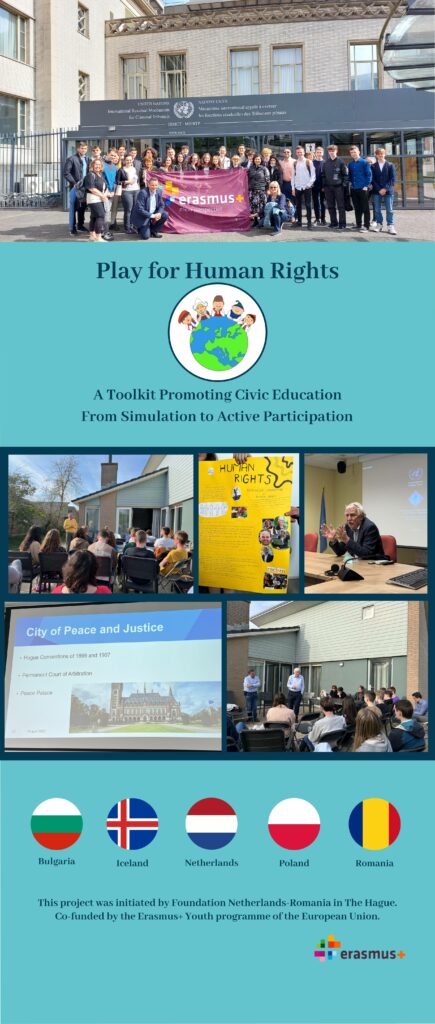
Through this initiative, we aimed at raising awareness on human rights issues and advocating for improving non-formal youth education in this field. The project addressed the needs coming forward from different editions of Moot Court Europe, where young people simulate trials and defend human rights in front of real Judges.
By playing active roles, they are encouraged to address their situations, taking action based on laws and values. They train skills on active citizenship and engagement in democratic life, in a non-formal educational setting. Each Moot Court project brought forward the positive impact a game can have on those participating. It underlined the need of offering youngsters diverse learning methods to help them learn about human rights, rule of law, democracy and justice. Which leads to the need of developing youth workers’ skills to approach human rights education in diverse and creative ways.
One way to support those working with young people was the creation of this learning platform: “Play for Human Rights – a Toolkit promoting Civic Education and Active Participation”.
The Toolkit is meant to help those involved in youth work to develop knowledge, civic skills and values to conduct human rights education. It contains didactic materials with elements of game simulation, designed and inspired by various project sessions taking place in The Hague, during the learning activity “Play for Human Rights – Don’t raise your voice, improve your arguments!” as well as during virtual cooperation and local actions organised by our partners, starting in December 2021.
The project is complementary to Moot Court editions, enabling youth workers to better understand values such as human rights or functioning of a democracy, in order to help youngsters develop a heightened respect for law, to recognize differences in opinions, to challenge the decision-making process and to become more aware of their rights and duties.
The Toolkit is organised on four modules: Games (including Simulated-trial scenarios, Quizzes, Kahoots!, Activity Plans and Working sheets), Videos, PowerPoints (with working sheets at the end) and Timelines (connected to games).
Its modules allow a more structural approach of human-rights education by applying Moot Court-inspired methods in raising youth awareness on human rights and international justice issues. Previous projects are adding value to this initiative by turning their results into new methods to learn about human rights.
The modules can be combined in a multitude of ways and the content can be implemented in the non-formal and informal education of youth. It can be used in schools, youth centres, courts and any other organisations dealing with the non-formal education of young people.
The project created a positive and long-lasting effect on the participants and participating organisations. It helped us improve our non-formal educational approach on human rights and gave us new insight on organising future editions of Moot Court youth projects.
The cooperation of all the actors involved resulted in creating innovative practices for teaching human rights, through simulation trial games and other developed methods.
The Toolkit allows various human rights competencies to be acquired by youngsters in different contexts: playing while developing arguments, logical and critical thinking, respect for rule of law, intercultural communication, self-awareness, active engagement and citizenship or problem-solving.
Through the Toolkit, we aim at empowering users to see human rights from multiple perspectives and to integrate them in their work with young people. The web-based tool is aimed to function as a resource for non-formal human rights education, offering creative learning modules to those who want to develop projects linking human rights, active citizenship and civic education in a non-formal, learning-by-doing approach.
The project was implemented by Foundation Netherlands-Romania in The Hague and its partners in Bulgaria (EUYouth), Iceland (Vopnafjörður), Poland (II Liceum Adama Mickiewicza) and Romania (Pedagogical College Carol I) and supported by Erasmus+ Youth Programme.
